“The case is unprecedented. What is that if not politics?” Human rights defenders interrogated in the Viasna case
The hearings of the criminal case against the Viasna chairman and the Nobel Peace Prize laureate Ales Bialiatski, his deputy and vice-president of FIDH Valiantsin Stefanovic, the coordinator of the Human rights defenders for free elections campaign Uladzimir Labkovich, and the human rights defender Zmitser Salauyou continue in the Lieninski District Court of Minsk. All 284 volumes of the criminal case were introduced to the court. In the next stage, the defendants themselves were questioned. Viasna tells what our fellow human rights defenders said in court.
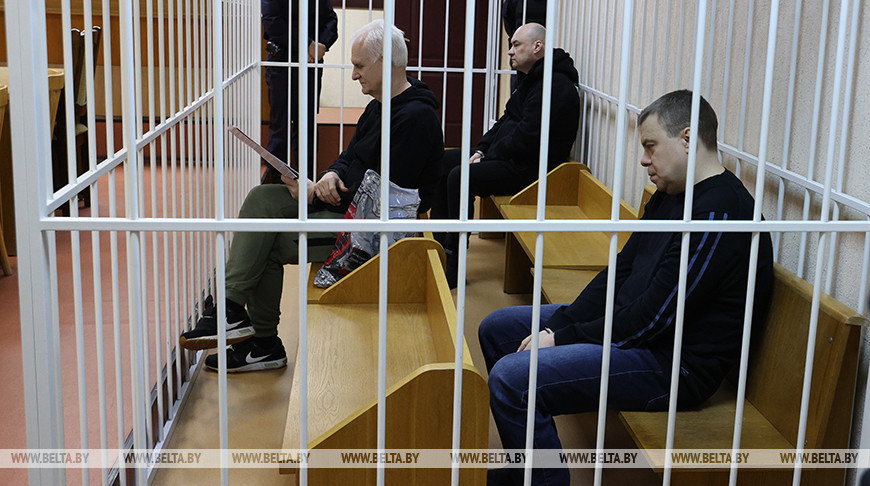
Viasna members on trial: A day-by-day chronology of the court
“I believe that all the accusations against me are fabricated”
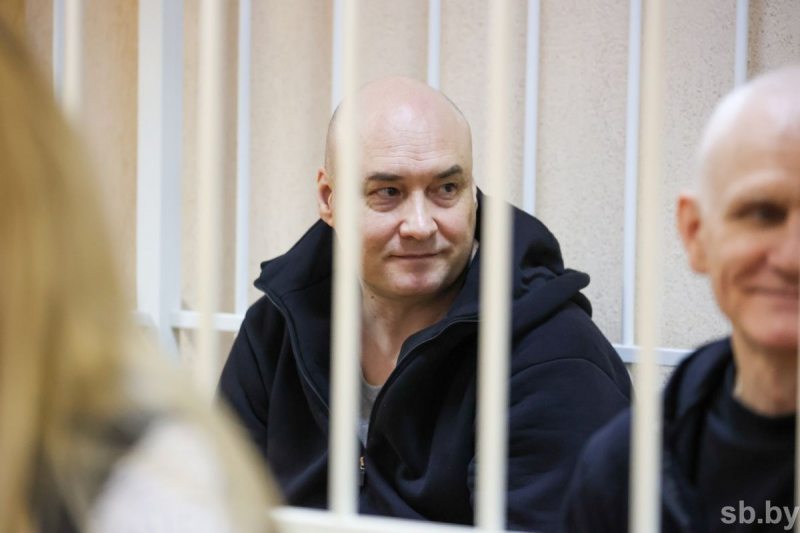
Valiantsin Stefanovic said that some of the activities of human rights defenders were carried out abroad, for example, human rights schools, because it was increasingly difficult to continue running them in Belarus. That is why the organization Pavasaris was created, which acted in the territory of Lithuania.
Stefanovic said that he received money from the Lithuanian organization under service agreements and stressed that he paid taxes in Belarus from them.
“I did not approve or sign any financial reports. I had no access to the accounts in the organization in Lithuania, I did not manage the money, I did not give money to other people, I did not instruct anyone, I did not give any instructions or advice on how to carry money across the border.
[...] After August 2020, in a situation where the law enforcement system had dropped out of the protection of citizens, the question arose of involving as many international mechanisms as possible in the protection of human rights in Belarus. That's why I actively participated in exploring and launching these tools, for example, the OSCE Moscow Mechanism, the work with the UN Committee against Torture, and special rapporteurs. This is what I was directly involved in at Viasna.”
As regards the charges under part 2 of Article 342 of the Criminal Code (“financing of group actions that grossly violate public order”), Stefanovic said that he strongly disagreed with the qualification, since he had not been engaged in paying fines. He knew about the BY_HELP Foundation from the media but had nothing to do with its activities.
Viasna vice chair pointed out that in 2003 the Human Rights Center was illegally deprived of its registration and said:
“Viasna's activity is legitimate and legal. Its activities have been and are being carried out in accordance with the UN Declaration on Human Rights Defenders. I repeat once again: everyone has the right, individually and in association with others, to promote and strive for the protection and realization of human rights and fundamental freedoms at the national and international levels. [...] There is no such thing as a license to be a human rights defender, nor could there ever be.”
The human rights defender emphasized:
“I believe that all the accusations against me are fabricated. I do not see any established fact, only speculations. The investigation has not established any facts of the one-time movement of any funds. Moreover, there are no facts about my involvement in these activities.”
Valiantsin Stefanovic flatly refused to answer the questions of the prosecutor and the judge.
“We wanted to formalize our financial activities so as not to fall into the same trap that I found myself in 2011”
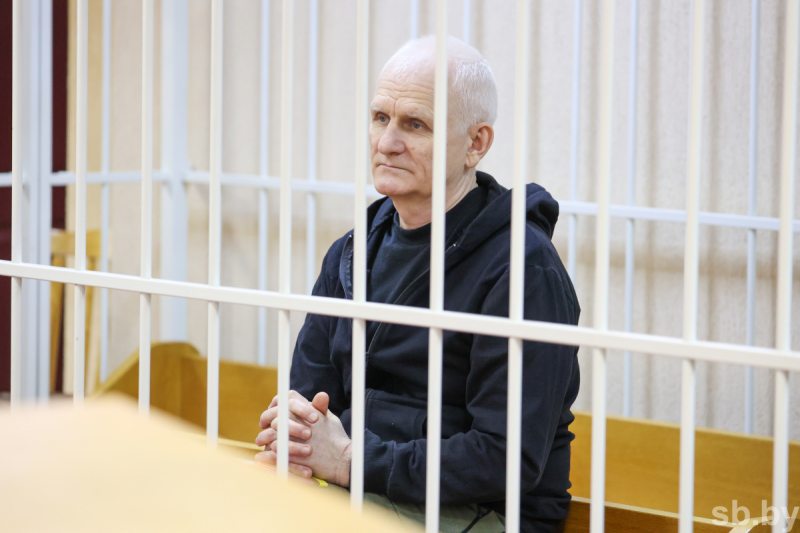
Ales Bialiatski gave his detailed testimony in the form of a free narrative. He repeatedly stressed that his prosecution was politically motivated. He said that he was released under amnesty in 2014 when other political prisoners began to be released. At the time, he was convicted of opening personal accounts in Lithuania and Poland, which were used to receive funds for the project activities of Viasna.
Bialiatski confirmed Stefanovic's words that in 2014—2016 almost all of the educational and outreach activities of Viasna were taken outside of Belarus to the territory of Lithuania:
“We wanted to formalize our financial activities so as not to fall into the same trap that I found myself in 2011.”
Bialiatski emphasized the importance of the UN Declaration on Human Rights Defenders as a UN framework document for Viasna's activities. The head of Viasna noted that funding for human rights activities is stipulated by Article 12 of the Declaration. He stressed that the work of Viasna is carried out within the framework of this and other articles.
“Pavasaris was funded through open programs”
“I want to draw attention to the fact that Pavasaris was registered in 2015, and the documents for its registration were filed in late 2014 when there was no criminal liability for the so-called smuggling, which we are now accused of. There was not until early 2016 that it emerged. Therefore, it is not possible to say that the creation and activity of Pavasaris were aimed at organizing large-scale smuggling,” Bialiatski said.
“A considerable part of the income that went through Pavasaris was transferred to Belarus in non-cash form. That's about $250,000 over the entire period. Taking into account the data from Belarusian banks, it was transferred to dozens of people via banks. This shows once again that Pavasaris didn't hide its activities. We worked as a normal non-governmental organization on the territory of Lithuania.
[...] Considering the papers in the case file, it is obvious that 90% of all the funds of the 300 thousand that are incriminated to us are meant for salaries. [...] And is it right to sum up all the salaries that the already mentioned Stefanovic received during those four or five years of Pavasaris existence as if it were one payment? These are different projects. These are different years and action periods of these projects. It's not a single payment. This money has been paid out separately, it's not one total amount. What the investigation says, that the money was purposely divided, transported, and then accumulated into one, is nonsense! No one accumulated any money, and there is no evidence that this money was accumulated.”
“It is immoral and heartless”
Bialiatski expressed his position on the charge under part 2 of Article 342 of the Criminal Code:
“I did not organize the fundraising personally, did not pass the money to the victims, and did not pay for the needs related to assistance to the victims of political repressions myself. Also, I did not receive money and did not distribute it to other people. I did not provide any training in disorderly conduct. I fully support the fact that the extension of Part 2 of Article 342 of the Criminal Code, which happened in 2020, is absurd, and it should not be done that way. Do you really see a backdoor in every law?
The criminalization of aid that occurred after the so-called offences were committed is inconsistent with logic. First the horse and then the cart, not the other way around. It is immoral and heartless.”
Ales Bialiatski refused to be questioned by the prosecutor and the judge in Russian:
“I am in Belarus, and I want to be asked in Belarusian.”
“Since 2015, I haven't had any functions in Viasna other than leading the Human Rights Defenders for Free Elections campaign”
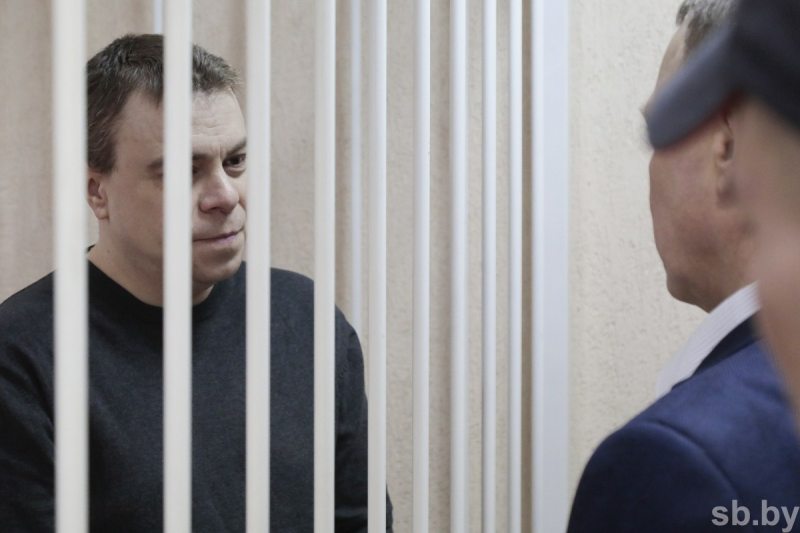
Uladzimir Labkovich was questioned last at the court. Just like his colleagues, he gave testimonies in the form of a free narrative. He stated that he supported what Stefanovich and Bialiatski had said.
“It is clear from all the materials of the case that I did not move money under part 4 of Article 228 of the Criminal Code in any way, I did not give such instructions to anyone, I did not join any criminal organized group for the sake of moving this money.
[Pavasaris] was founded as a means of obtaining money so that it could be declared as income. There were no other activities with my participation. And those signatures from Pavasaris, which are in the case file, were not mine.
I would also like to point out that I have not been a member of the Human Rights Center Viasna since the beginning of 2015, so I have not had any functions in Viasna other than the Human Rights Defenders for Free Elections campaign since 2015. The coordinator of the Human Rights Defenders for Free Elections campaign was solely responsible for preparing official analytical materials that were publicly posted on our website. The two main goals of the campaign were to assess whether the Republic of Belarus fulfills its international obligations, and the second was to help the state, the Belarusian authorities to improve the issues related to the implementation of citizens' electoral rights.”
With regard to Article 342 of the Criminal Code, Labkovich pointed out that within the framework of this criminal case, it was not mentioned that he had somehow interacted with regard to payment of fines and other taxes, talked about it, and communicated.
At the hearing, the prosecutor presented him with the signatures on the service agreements with Human Rights Defenders for Free Elections campaign observers for examination. Labkovich did not recognize the signatures as his own and said that he had offered the investigator to carry out expertise, but it was not done. The prosecutor noted that the signatures of Labkovich on the interrogation report and these documents indeed look not the same.
Interrogation records of Zmitser Salauyou and seized documents not listed in the search report
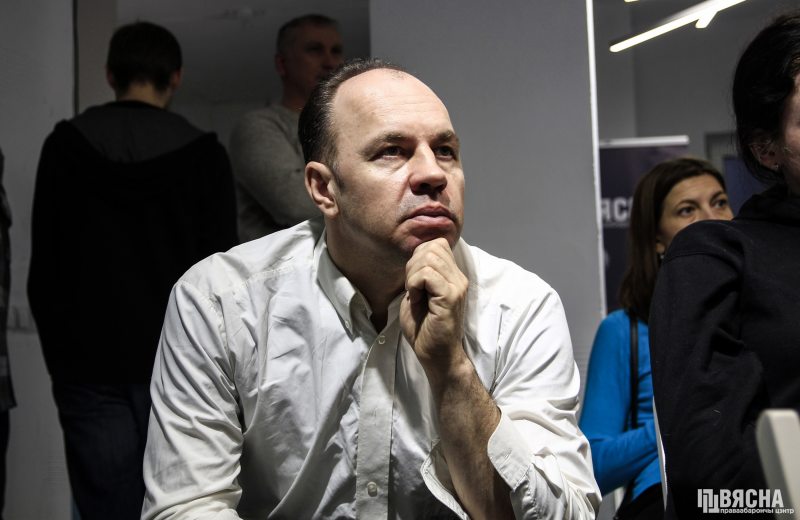
Three protocols of interrogation of the human rights defender Zmitser Salauyou, who is on trial in this criminal proceeding in the framework of special proceedings, were announced at the trial.
His first interrogation as a witness in the case of Sudalenka, Lasitsa, and Tarasenka took place on February 25, 2021, during his administrative imprisonment. He refused to testify then because of his health condition.
On March 2, 2021, Salauyou was questioned as a suspect under part 2 of Article 342 of the Criminal Code. Then he explained that the activities of Viasna had nothing to do with the financing of protests, and he was not involved in the incriminated actions. Human rights defender apparently refused to testify, referring to Article 27 of the Constitution.
This concluded the judicial investigation into the Viasna case. The court will hear the closing arguments on January 9 at 10:30 a.m.

















